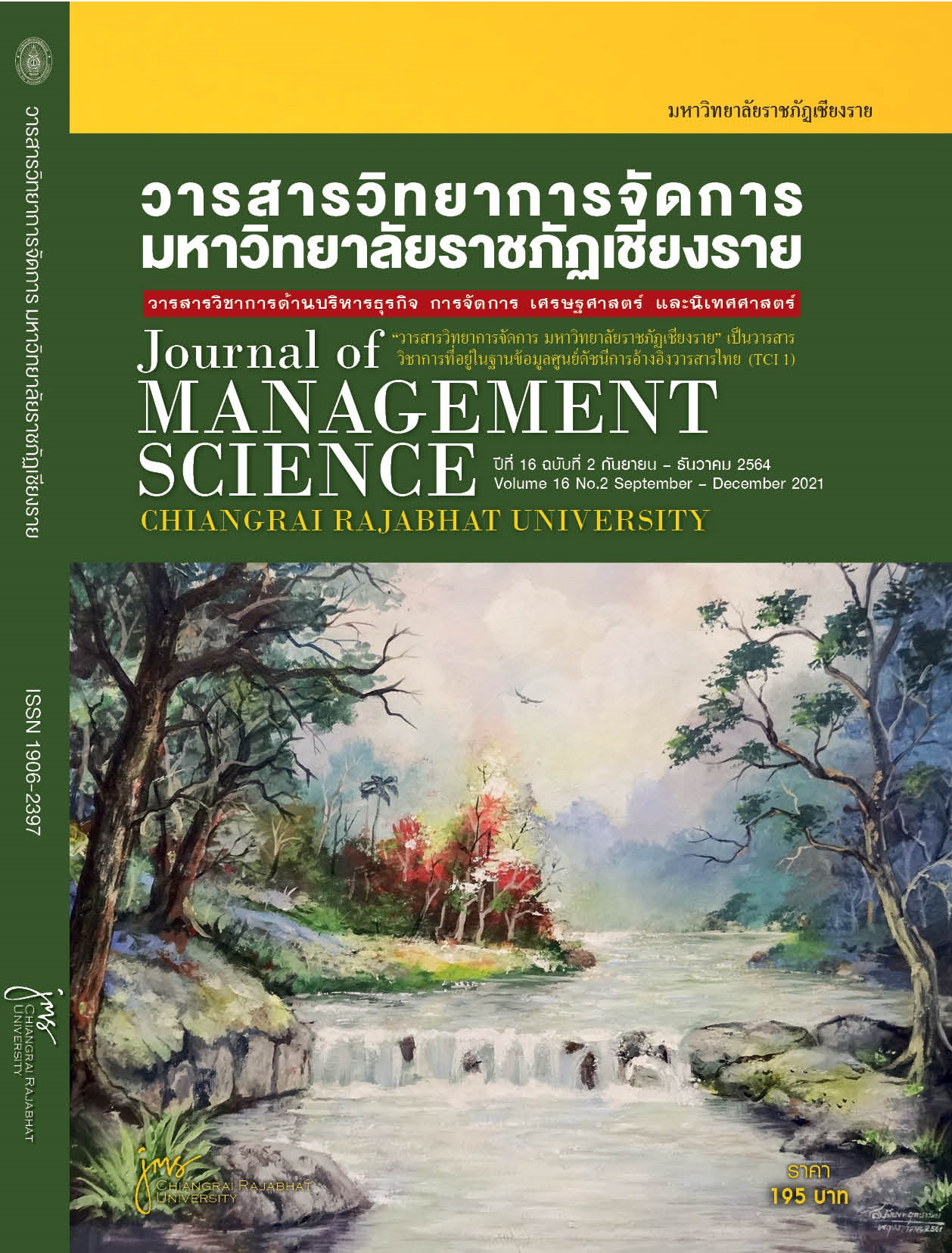ปัจจัยจากความไว้ใจแรกเริ่มที่ส่งผลต่อความตั้งใจโดยสารในรถยนต์ไร้คนขับ
Main Article Content
บทคัดย่อ
เป็นที่คาดหมายกันว่าคนทั่วไปจะได้ใช้บริการรถยนต์ไร้คนขับในอนาคตอันใกล้ แม้ว่ารถยนต์ไร้คนขับ จะมีข้อดีหลายอย่างเมื่อเทียบกับรถยนต์ที่ใช้คนขับ แต่ก็มีบางคนที่ไม่กล้าโดยสารในรถยนต์ไร้คนขับจากความเสี่ยงที่มีในการโดยสารในรถยนต์ไร้คนขับ ในสถานการณ์ที่มีความเสี่ยงเช่นนี้ความไว้ใจในรถยนต์ไร้คนขับเป็นปัจจัยที่สำคัญที่มีผลต่อการตัดสินใจโดยสารรถยนต์ไร้คนขับ งานวิจัยนี้มีวัตถุประสงค์เพื่อศึกษา 1) ผลของความเอนเอียงของการไว้ใจต่อระบบอัตโนมัติที่มีต่อความตั้งใจโดยสารในรถยนต์ไร้คนขับ 2) ผลของความสามารถในการขับขี่ยานพาหนะที่มีต่อความตั้งใจโดยสารในรถยนต์ไร้คนขับ 3) ผลของความเข้าใจเกี่ยวกับการทำงานของรถยนต์ไร้คนขับที่มีต่อความตั้งใจโดยสารในรถยนต์ไร้คนขับ และ 4) เพื่อเปรียบเทียบความตั้งใจโดยสารในรถยนต์ไร้คนขับระหว่างก่อนและหลังการได้รับความรู้เกี่ยวกับการทำงานของรถยนต์ไร้คนขับ โดยใช้ระเบียบวิธีวิจัยเชิงปริมาณ การศึกษาครั้งนี้ เก็บข้อมูลด้วยแบบสอบถามจากนักศึกษาปริญญาตรี จำนวน 108 คน ซึ่งวิเคราะห์ข้อมูลด้วยวิธีการทดสอบสมมติฐานโดยใช้สถิติ Multiple Regression Analysis และใช้สถิติ Paired-samples T-test ผลการศึกษาพบว่า 1) ความเอนเอียงของการไว้ใจต่อระบบอัตโนมัติส่งผลเชิงบวกต่อความตั้งใจโดยสารในรถยนต์ไร้คนขับ 2) ความสามารถในการขับขี่ยานพาหนะส่งผลเชิงลบต่อความตั้งใจโดยสารในรถยนต์ไร้คนขับ 3) ความเข้าใจเกี่ยวกับการทำงานของรถยนต์ไร้คนขับส่งผลเชิงบวกต่อความตั้งใจโดยสารในรถยนต์ไร้คนขับ และ 4) ความตั้งใจโดยสารในรถยนต์ไร้คนขับระหว่างก่อนและหลังได้รับความรู้เกี่ยวกับการทำงานของรถยนต์ไร้คนขับแตกต่างกันอย่างไม่มีนัยสำคัญทางสถิติ
Article Details
ทัศนะและข้อคิดเห็นของบทความที่ปรากฏในวารสารฉบับนี้เป็นของผู้เขียนแต่ละท่าน ไม่ถือว่าเป็นทัศนะและความรับผิดชอบของกองบรรณาธิการ
เอกสารอ้างอิง
Ajzen, I. (1991). The theory of planned behavior. Organizational behavior and human decision processes. 50(2), 179-211.
Ajzen, I. & Fishbein, M. (1975). Belief, attitude, intention and behavior: an introduction to theory and research. Reading. MA : Addision-Wesley.
Bimbraw, K. (2015). Autonomous cars: Past, present and future a review of the developments in the last century, the present scenario and the expected future of autonomous vehicle technology. International Conference on Informatics in Control, Automation and Robotics (ICINCO). 1, 191-198.
Biros, D. P., Fields, G. & Gunsch, G. (2003). The effect of external safeguards on human-information system trust in an information warfare environment. In 36th Annual Hawaii International Conference on System Sciences, 2003. Proceedings of the (pp. 10-pp). IEEE.
Cohen, M. S., Parasuraman, R. & Freeman, J. (1998). Trust in decision aids: A model and a training strategy. Paper presented at the Command and Control Research and Technology Symposium, Washington, DC.
de Vries, P., Midden, C. & Bouwhuis, D. (2003). The effects of errors on system trust, self-confidence, and the allocation of control in route planning. International Journal of Human-Computer Studies. 58(6), 719-735.
Emerj Artificial Intelligence Research. (2020). The Self-Driving Car Timeline – Predictions from the Top 11 Global Automakers. Retrieved April 22, 2020, from https://emerj.com/ai-adoption-timelines/self-driving-car-timeline-themselves-top-11-automakers/.
Fan, R., Jiao, J., Ye, H., Yu, Y., Pitas, I. & Liu, M. (2019). Key ingredients of self-driving cars. arXiv preprint arXiv:1906.02939.
Fan, X., Oh, S., McNeese, M., Yen, J., Cuevas, H., Strater, L. & Endsley, M. R. (2008). The influence of agent reliability on trust in human-agent collaboration. In Proceedings of the 15th European conference on Cognitive ergonomics: the ergonomics of cool interaction (pp. 1-8).
Hoff, K. A., & Bashir, M. (2015). Trust in automation: Integrating empirical evidence on factors that influence trust. Human Factors. 57(3), 407-434.
James, G., Witten, D., Hastie, T. & Tibshirani, R. (2013). An introduction to statistical learning (Vol. 112, p. 18). New York: springer.
Koustanaï, A., Cavallo, V., Delhomme, P. & Mas, A. (2012). Simulator training with a forward collision warning system effects on driver-system interactions and driver trust. Human Factors. 54, 709–721.
McKnight, D. H., Cummings, L. L. & Chervany, N. L. (1998). Initial trust formation in new organizational relationships. Academy of Management review. 23(3), 473-490.
Merritt, S. M., Heimbaugh, H., LaChapell, J. & Lee, D. (2013). I trust it, but I don’t know why: Effects of implicit attitudes toward automation on trust in an automated system. Human factors. 55(3), 520-534.
Merritt, S. M. & Ilgen, D. R. (2008). Not all trust is created equal: Dispositional and history-based trust in human-automation interactions. Human Factors. 50(2), 194-210.
Riegelsberger, J., Sasse, M. A. & McCarthy, J. D. (2005). The mechanics of trust: A framework for research and design. International Journal of Human-Computer Studies. 62(3), 381-422.
Rödel, C., Stadler, S., Meschtscherjakov, A. & Tscheligi, M. (2014). Towards autonomous cars: The effect of autonomy levels on acceptance and user experience. In Proceedings of the 6th international conference on automotive user interfaces and interactive vehicular applications (pp. 1-8).
Rousseau, D.M., Sitkin, S. B., Burt, R. S. & Camerer, C. (1998). Not so different after all: A cross-discipline view of trust. Academy of management review. 23(3), 393-404.
Zanchin, B. C., Adamshuk, R., Santos, M. M. & Collazos, K. S. (2017). On the instrumentation and classification of autonomous cars. In 2017 IEEE International Conference on Systems, Man, and Cybernetics (SMC) (pp. 2631-2636). IEEE.


